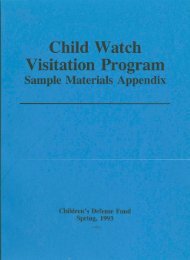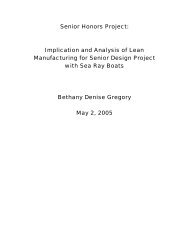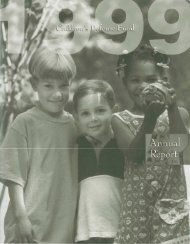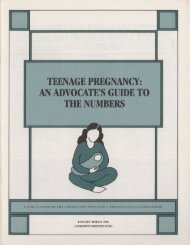children out of school in america - University of Tennessee Digital ...
children out of school in america - University of Tennessee Digital ...
children out of school in america - University of Tennessee Digital ...
Create successful ePaper yourself
Turn your PDF publications into a flip-book with our unique Google optimized e-Paper software.
Who Are the Children Out <strong>of</strong> School?<br />
Chapter 1<br />
Child.een Out <strong>of</strong> School<br />
And What It Means to Them<br />
There are some <strong>children</strong> who have never gone to<br />
<strong>school</strong>. Their parents or guardians do not register<br />
them, and <strong>school</strong> <strong>of</strong>ficials do not try to f<strong>in</strong>d <strong>out</strong> how<br />
many <strong>of</strong> them there are. To the system, they are the<br />
unknowns, <strong>in</strong>clud<strong>in</strong>g:<br />
-special needs <strong>children</strong>, particularly the severely<br />
mentally and physically handicapped<br />
-immigrant <strong>children</strong><br />
-migrant <strong>children</strong><br />
-Alaskan and other Native American <strong>children</strong><br />
who live <strong>in</strong> remote areas and have no local<br />
<strong>school</strong>s, and whose parents refuse to send them<br />
to board<strong>in</strong>g <strong>school</strong>s far away from home<br />
There are other <strong>children</strong> who have tried to enroll<br />
at some time but who were not accepted by the <strong>school</strong><br />
system. They want to be <strong>in</strong> <strong>school</strong>, but are told by<br />
<strong>school</strong> <strong>of</strong>ficials that it is not the place they should be.<br />
These are excluded <strong>children</strong>, such as:<br />
--<strong>children</strong> who register too late <strong>in</strong> the <strong>school</strong> year<br />
-<strong>in</strong>cont<strong>in</strong>ent <strong>children</strong> or those with sp<strong>in</strong>a bifida 1<br />
1 Sp<strong>in</strong>a bifida is one <strong>of</strong> the most common birth defects<br />
caus<strong>in</strong>g disability <strong>in</strong> <strong>in</strong>fancy and childhood. It is a congenital<br />
condition <strong>in</strong> which the bony elements <strong>of</strong> the sp<strong>in</strong>e<br />
have not made a complete closure, leav<strong>in</strong>g an open<strong>in</strong>g <strong>in</strong><br />
the neural tube. Sp<strong>in</strong>a bifida is frequently accompanied<br />
by hydrocephalus which is an <strong>in</strong>crease <strong>of</strong> cerebrosp<strong>in</strong>al<br />
fluid <strong>in</strong> the cranial cavity caus<strong>in</strong>g pressure and enlargement<br />
<strong>of</strong> the size <strong>of</strong> the head. Children with sp<strong>in</strong>a bifida who do<br />
not have hydrocephalus do not deviate significantly <strong>in</strong> <strong>in</strong>tellectual<br />
function from the normal population. They can be<br />
educated <strong>in</strong> regular classes provid<strong>in</strong>g modifications are<br />
--<strong>children</strong> whom <strong>school</strong> <strong>of</strong>ficials deem "immature"<br />
-older <strong>children</strong> who try to enroll for the first time<br />
<strong>in</strong> a new <strong>school</strong> district<br />
--<strong>children</strong> on wait<strong>in</strong>g lists for special programs<br />
-special needs <strong>children</strong> for whom there are no<br />
appropriate programs, particularly the physically,<br />
mentally, and emotionally handicapped,<br />
and non-English-speak<strong>in</strong>g or bil<strong>in</strong>gual <strong>children</strong><br />
-<strong>children</strong> who are beyond normal transportation<br />
r<strong>out</strong>es <strong>in</strong> remote rural areas<br />
-<strong>children</strong> <strong>in</strong> jails 2<br />
Some <strong>children</strong> have been enrolled <strong>in</strong> <strong>school</strong>, but<br />
later are forced to leave because <strong>of</strong> overt or covert<br />
<strong>school</strong> policies. These are the pushouis, such as:<br />
-pregnant girls, <strong>school</strong>-age mothers and married<br />
students<br />
-expelled or suspended <strong>children</strong><br />
--drop<strong>out</strong>s<br />
--drop<strong>out</strong>s who want to re-enroll and are not permitted<br />
to do so<br />
-older <strong>children</strong> who are counseled or encouraged<br />
to withdraw. For example, parents are told to<br />
keep <strong>children</strong> at home on threat <strong>of</strong> court referral<br />
made for those who have orthopedic and ur<strong>in</strong>ary <strong>in</strong>volvement.<br />
See Samuel A. Kirk, Educat<strong>in</strong>g Exceptional Children<br />
(Boston: Houghton Miffl<strong>in</strong> Co., 1972), p. 366.<br />
2 These <strong>children</strong> are, <strong>in</strong> fact, totally <strong>out</strong> <strong>of</strong> <strong>school</strong> dur<strong>in</strong>g the<br />
period <strong>of</strong> their jail detention. Ab<strong>out</strong> 38,000 <strong>children</strong> under<br />
age 16 are <strong>in</strong> jail on a given day. This figure does not<br />
<strong>in</strong>clude city jails and lock-ups. A subsequent CDP study<br />
<strong>of</strong> <strong>children</strong> <strong>in</strong> adult jails will show that the figures used do<br />
not tell the whole story: it is likely that between 250,000<br />
and 400,000 <strong>children</strong> are jailed annually. There is no education<br />
provided <strong>in</strong> jail.<br />
17














